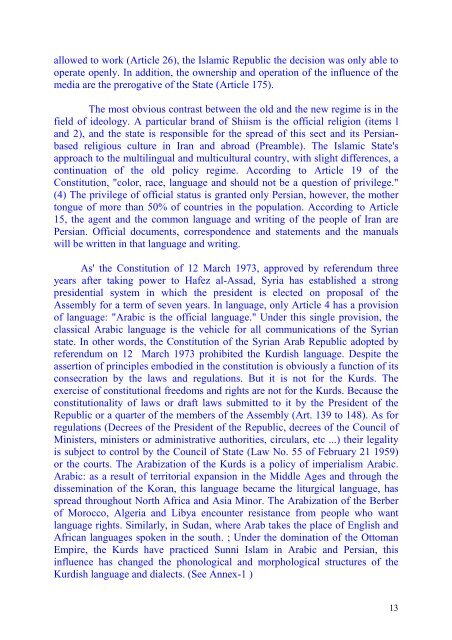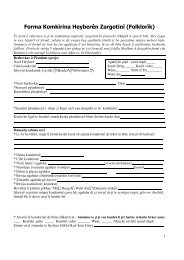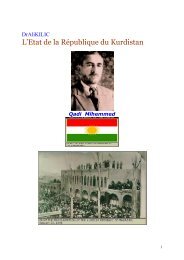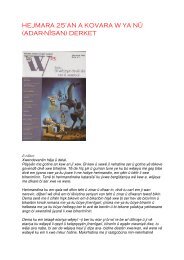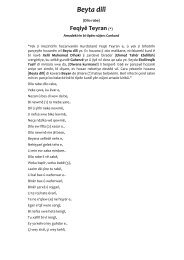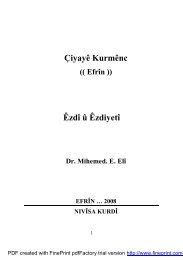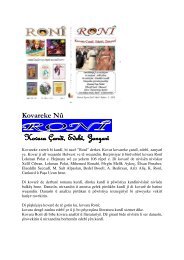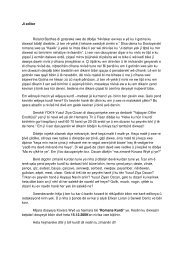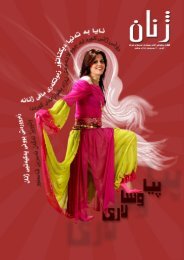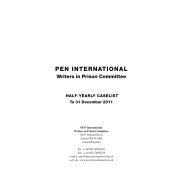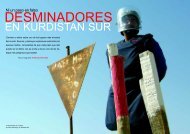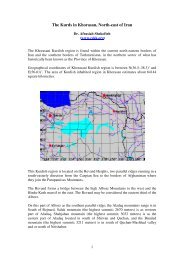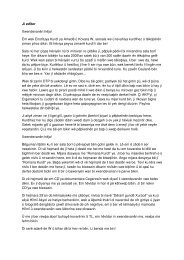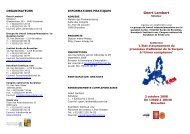UNESCO and The International Day of Mother Language - Pen-Kurd
UNESCO and The International Day of Mother Language - Pen-Kurd
UNESCO and The International Day of Mother Language - Pen-Kurd
- No tags were found...
Create successful ePaper yourself
Turn your PDF publications into a flip-book with our unique Google optimized e-Paper software.
allowed to work (Article 26), the Islamic Republic the decision was only able to<br />
operate openly. In addition, the ownership <strong>and</strong> operation <strong>of</strong> the influence <strong>of</strong> the<br />
media are the prerogative <strong>of</strong> the State (Article 175).<br />
<strong>The</strong> most obvious contrast between the old <strong>and</strong> the new regime is in the<br />
field <strong>of</strong> ideology. A particular br<strong>and</strong> <strong>of</strong> Shiism is the <strong>of</strong>ficial religion (items l<br />
<strong>and</strong> 2), <strong>and</strong> the state is responsible for the spread <strong>of</strong> this sect <strong>and</strong> its Persianbased<br />
religious culture in Iran <strong>and</strong> abroad (Preamble). <strong>The</strong> Islamic State's<br />
approach to the multilingual <strong>and</strong> multicultural country, with slight differences, a<br />
continuation <strong>of</strong> the old policy regime. According to Article 19 <strong>of</strong> the<br />
Constitution, "color, race, language <strong>and</strong> should not be a question <strong>of</strong> privilege."<br />
(4) <strong>The</strong> privilege <strong>of</strong> <strong>of</strong>ficial status is granted only Persian, however, the mother<br />
tongue <strong>of</strong> more than 50% <strong>of</strong> countries in the population. According to Article<br />
15, the agent <strong>and</strong> the common language <strong>and</strong> writing <strong>of</strong> the people <strong>of</strong> Iran are<br />
Persian. Official documents, correspondence <strong>and</strong> statements <strong>and</strong> the manuals<br />
will be written in that language <strong>and</strong> writing.<br />
As' the Constitution <strong>of</strong> 12 March 1973, approved by referendum three<br />
years after taking power to Hafez al-Assad, Syria has established a strong<br />
presidential system in which the president is elected on proposal <strong>of</strong> the<br />
Assembly for a term <strong>of</strong> seven years. In language, only Article 4 has a provision<br />
<strong>of</strong> language: "Arabic is the <strong>of</strong>ficial language." Under this single provision, the<br />
classical Arabic language is the vehicle for all communications <strong>of</strong> the Syrian<br />
state. In other words, the Constitution <strong>of</strong> the Syrian Arab Republic adopted by<br />
referendum on 12 March 1973 prohibited the <strong>Kurd</strong>ish language. Despite the<br />
assertion <strong>of</strong> principles embodied in the constitution is obviously a function <strong>of</strong> its<br />
consecration by the laws <strong>and</strong> regulations. But it is not for the <strong>Kurd</strong>s. <strong>The</strong><br />
exercise <strong>of</strong> constitutional freedoms <strong>and</strong> rights are not for the <strong>Kurd</strong>s. Because the<br />
constitutionality <strong>of</strong> laws or draft laws submitted to it by the President <strong>of</strong> the<br />
Republic or a quarter <strong>of</strong> the members <strong>of</strong> the Assembly (Art. 139 to 148). As for<br />
regulations (Decrees <strong>of</strong> the President <strong>of</strong> the Republic, decrees <strong>of</strong> the Council <strong>of</strong><br />
Ministers, ministers or administrative authorities, circulars, etc ...) their legality<br />
is subject to control by the Council <strong>of</strong> State (Law No. 55 <strong>of</strong> February 21 1959)<br />
or the courts. <strong>The</strong> Arabization <strong>of</strong> the <strong>Kurd</strong>s is a policy <strong>of</strong> imperialism Arabic.<br />
Arabic: as a result <strong>of</strong> territorial expansion in the Middle Ages <strong>and</strong> through the<br />
dissemination <strong>of</strong> the Koran, this language became the liturgical language, has<br />
spread throughout North Africa <strong>and</strong> Asia Minor. <strong>The</strong> Arabization <strong>of</strong> the Berber<br />
<strong>of</strong> Morocco, Algeria <strong>and</strong> Libya encounter resistance from people who want<br />
language rights. Similarly, in Sudan, where Arab takes the place <strong>of</strong> English <strong>and</strong><br />
African languages spoken in the south. ; Under the domination <strong>of</strong> the Ottoman<br />
Empire, the <strong>Kurd</strong>s have practiced Sunni Islam in Arabic <strong>and</strong> Persian, this<br />
influence has changed the phonological <strong>and</strong> morphological structures <strong>of</strong> the<br />
<strong>Kurd</strong>ish language <strong>and</strong> dialects. (See Annex-1 )<br />
13


